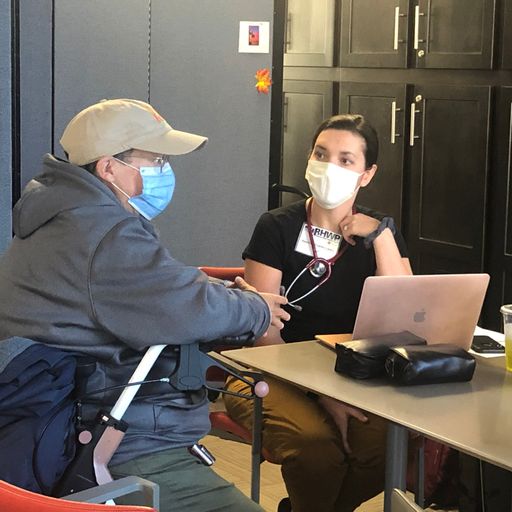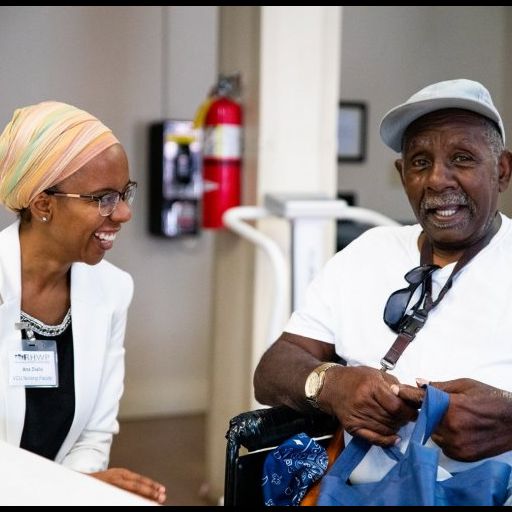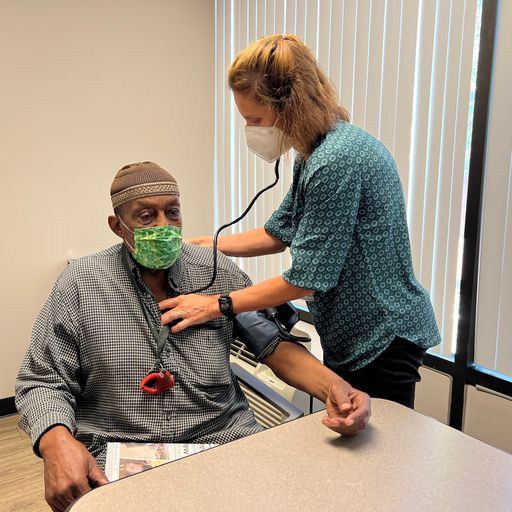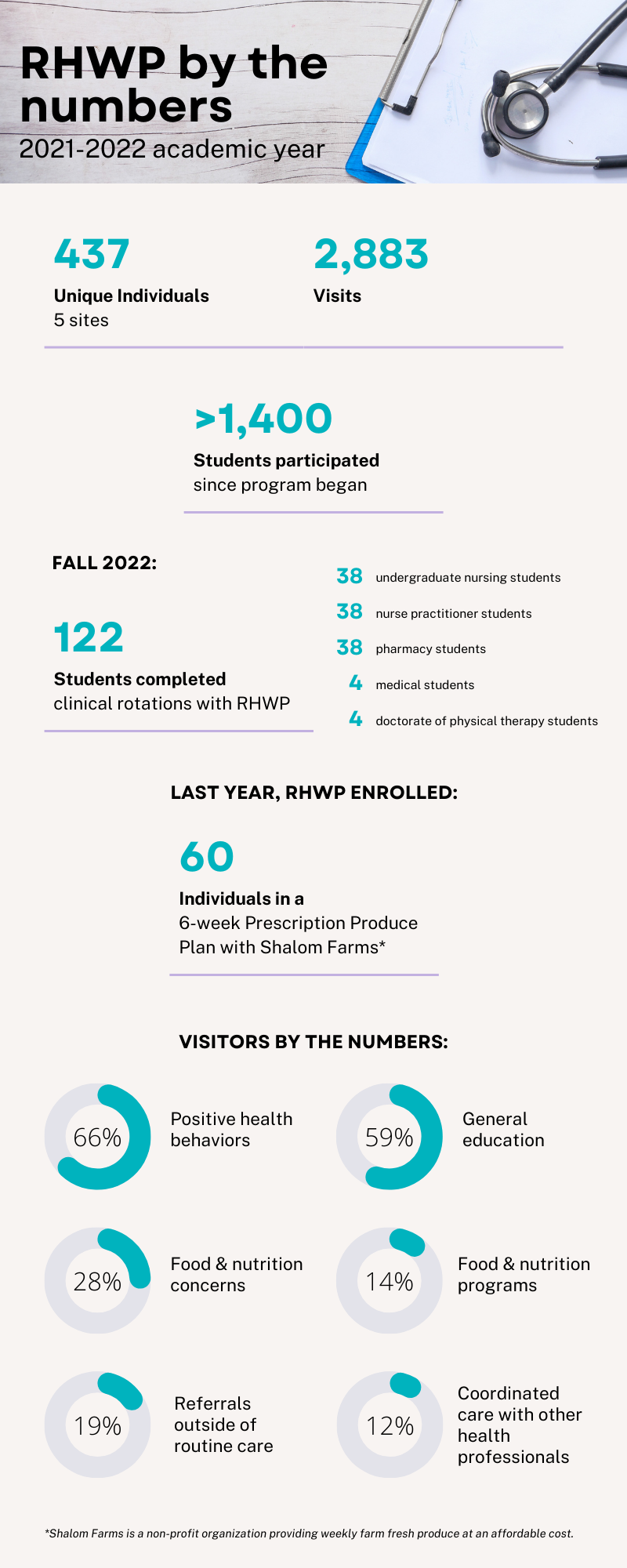Community of Care
Toward a Healthier Virginia for All
This article is part of an ongoing series of stories highlighting VCU Health programs and initiatives aimed at addressing issues of access and equity in health care.

Now in its tenth year, the Richmond Health and Wellness Program (RHWP) brings care coordination to the doorstep of vulnerable communities in Central Virginia.
University-sponsored health clinics are common across the nation, but RHWP, spearheaded by the VCU School of Nursing, has earned a reputation as a model for holistic care coordination. Established in 2012, the program delivers weekly wellness clinics that focus on health assessment, monitoring and coaching in five community-based sites across the Richmond region.
Powered by about 100 VCU students guided by faculty each semester, RHWP offers education on effective chronic disease self-management, wellness coaching through healthy cooking demonstrations and diet management education, and care coordination to proactively manage other health issues and related social needs before they develop into emergencies.
Last year alone, the program served 437 unique individuals over a total of 2,883 visits.
An Interprofessional Educational Model
 In ten years, the program has evolved, incorporating students from across VCU’s health science disciplines including nursing, pharmacy, medicine, social work, physical therapy, occupational therapy, kinesiology and psychology.
In ten years, the program has evolved, incorporating students from across VCU’s health science disciplines including nursing, pharmacy, medicine, social work, physical therapy, occupational therapy, kinesiology and psychology.
Residents of any of the community-based sites can participate in weekly clinics, either with a scheduled 30-minute wellness visit or as a walk-in for unplanned or immediate needs. Kathie Falls, RN, director of clinical operations for RHWP, explains that identifying gaps in care, supporting referrals, and promoting self-efficacy and self-management are key services that the program delivers.
“RHWP is a safety net for our participants who are at high risk for negative health outcomes,” she said. ‘Our health care system is complicated and can be hard to navigate when a person has limited access to transportation or technology, or has low health literacy. We know that if we can connect people to services and necessary resources and provide tailored education, we can help people self-manage their healthcare needs and improve outcomes.”
Visits frequently center around helping participants understand their conditions, how to proactively manage them and connecting them to information and resources.
“By meeting people where they are and really listening to what’s important to them, we can tailor our services to their specific needs, which makes all the difference,” Falls said. “We’re here to advocate for people and empower them to ask for what they need. When necessary, we can step in and help them articulate their needs to providers and health care workers whether in the emergency room or in their primary care provider’s office. We can help them tell their story.”
Real Life Lessons
 RHWP presents a range of opportunities for students to train for their future in collaborative health care. Clinic days start with a debrief from a program leader, then they’re given space to help participants independently.
RHWP presents a range of opportunities for students to train for their future in collaborative health care. Clinic days start with a debrief from a program leader, then they’re given space to help participants independently.
Students rotate through various positions during their time with the clinic. They might be assigned to assist with monitoring blood pressure or glucose one day, then provide more comprehensive self-management and education during the next visit. Following participant visits, program leaders and students reconvene to review notes and create a plan for the participant’s next visit.
Opportunities for students to integrate practice in a clinic setting like those that RHWP provides are invaluable.
“We are very mindful that our students come from different backgrounds,” said Kimberly Battle, Ph.D., clinical assistant professor in the Department of Family and Community Health Nursing. “As educators, we know the importance of teaching them lessons in compassion, the viability of care implementation and affordability, and building a rapport with those they provide care to.”
As Battle shares with those students in clinic that she supervises, the most instructive and influential lessons may come from an unexpected source. “We coach students on how to integrate these aspects of being a provider into their practice because every interaction with someone in their care is an opportunity to learn,” she said.
“Social isolation is a huge issue for older adults in general, particularly older adults with limited income,” Falls said. “The pandemic absolutely made this situation worse. At RHWP, we provide a forum for an intergenerational connection between our participants and the students who are able to listen to the concerns and needs of our participants and provide tailored education and feedback. I see it all the time – our participants open up to students about things they’ve been afraid to ask in the past. Maybe they’re embarrassed or haven’t been able to find the words, but they ask the students and they get an answer.”
New Horizons
 With a decade of success as its foundation, RHWP continues to grow. A recent grant of nearly $4 million in funding from the Health Resources & Services Administration will enable the program to reach new communities with the addition of a mobile van.
With a decade of success as its foundation, RHWP continues to grow. A recent grant of nearly $4 million in funding from the Health Resources & Services Administration will enable the program to reach new communities with the addition of a mobile van.
“We are taking our program on the road. We know that there are geographic hot spots for chronic disease,” Battle said. “Our new mobile clinic will bring wellness resources and education directly to communities with the most need. I look forward to bringing our prescription produce program, our interprofessional educational model, and, most of all, our excellent nursing students in service of building trust and rapport with these communities.”
If you are interested helping RHWP grow and continue to impact lives in Central Virginia, consider making a gift to the Crystal Goodwin Community Engagement Fund at the VCU School of Nursing. Make a gift online or contact Pam Lowe, senior director of development at the school, at 804-827-0020 or plowe@vcu.edu for more information.

Support Community Care
Help RHWP grow and continue to impact lives in Central Virginia.